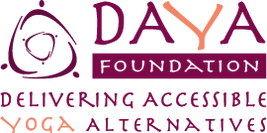Why Combine Yoga & Social Justice?
Social Justice is based on the concept of human rights in which all humans have, as their birthright, the freedom to realize themselves. Yet, we live in a world with much social injustice, an injustice to which we, often unknowingly, contribute. Yoga is called a path of self-realization; yet this realization, to truly serve oneself or others, isn’t the realization of who we have been or who we might become, but rather the realization of who we are in our shared humanity, our vulnerability and our potential.
Yoga has within it the profound capacity to awaken us to this shared humanity as we discover in ourselves both the seeds of human capacity and the seeds of suffering. Blessedly, yoga also provides us with the tools to nourish the seeds of capacity and to address the seeds of suffering.
Yoga as an interpersonal tool is uniquely powerful as a means to social justice for, in the transmission of yoga from teacher to student, the perceived hierarchy, separateness, or labels of “the one in need” and “the one who supplies that need” dissolve in the shared experiences of breath, movement, and the surrender of identification to who we are or who we have been and who we perceive the other to be or to have been. It is the journey, outlined in the Bhagavad Gita, within the contemporary dharmic field: the yoga mat.
When yoga is positioned to be accessible, inclusive, and respectful of the diversity and dignity of each student, it becomes a social justice catalyst – an opportunity for students, through the explorations of yoga’s life skills and tools for personal well-being, to experience themselves as Belonging, as worthy of their own Advocacy and Empowerment, and as capable of making Contributions to the betterment of the whole.
Fundamentally, yoga and social justice is based on the following principles:
Yoga has within it the profound capacity to awaken us to this shared humanity as we discover in ourselves both the seeds of human capacity and the seeds of suffering. Blessedly, yoga also provides us with the tools to nourish the seeds of capacity and to address the seeds of suffering.
Yoga as an interpersonal tool is uniquely powerful as a means to social justice for, in the transmission of yoga from teacher to student, the perceived hierarchy, separateness, or labels of “the one in need” and “the one who supplies that need” dissolve in the shared experiences of breath, movement, and the surrender of identification to who we are or who we have been and who we perceive the other to be or to have been. It is the journey, outlined in the Bhagavad Gita, within the contemporary dharmic field: the yoga mat.
When yoga is positioned to be accessible, inclusive, and respectful of the diversity and dignity of each student, it becomes a social justice catalyst – an opportunity for students, through the explorations of yoga’s life skills and tools for personal well-being, to experience themselves as Belonging, as worthy of their own Advocacy and Empowerment, and as capable of making Contributions to the betterment of the whole.
Fundamentally, yoga and social justice is based on the following principles:
- When human beings are marginalized, shunned, isolated, or institutionalized we all suffer.
- Those who are pushed to the margins, or the shadows, represent the shadow side of our very selves, our culture and our communities. That which we can shun, is that which we shun in ourselves too.
- Those who are pushed to the shadows have critical things to teach us. We need to learn, from them, about their experiences of life and belonging (or the lost sense of belonging).
- When humans don’t feel they have a voice, they will act from a place of powerlessness and they will experience psychological pain that profoundly shapes their survival strategies.
- If we are to bring about a balanced community, one that supports the needs of all of its members and enables each of us to grow into our interpersonal and psychological, as well as spiritual, potentials, re-engaging these community members is essential.
- Yoga teaches fundamental life skills.
- These life skills transform our mental and physical health.
- These life skills make us better individuals, family members, and community members.
- All members of our community deserve access to the life-enhancing practices of yoga.
- All members of our community have something to teach us about life, human suffering, and human potential.
- When community is created, healing happens, for it re-knits our experience of belonging.
